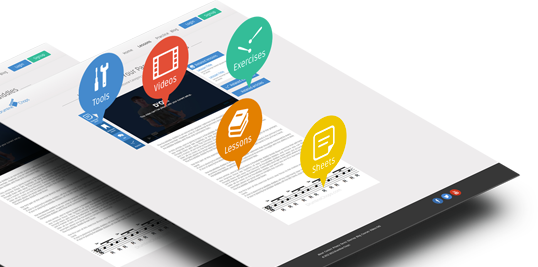
Andrew Ziehm is a percussionist and performer from Modesto, California.
Andrew is primarily a snare drummer and has performed with the Santa Clara Vanguard Winter Percussion and Blue Devils B Drum and Bugle Corps. Ziehm's writing style is a culmination of many of his instructors including Shekhar Khedakar and Joseph Avery and others such as Casey Brohard, Dave Flores, and Rudy Garcia. Andrew has composed a number of marching percussion pieces including Scintilla and runs a popular marching percussion YouTube channel.
Here's the interview:
Drumline Chops: How did you first get introduced and involved with marching percussion?
Andrew Ziehm: I've pretty much been involved with music and marching music my entire life. Pretty much everyone in my family plays an instrument, and almost all of them have been involved in the activity. One of my brothers marched contra, and my other brother performed with the Concord Blue Devils Color guard for 3 years and is now on staff there. So needless to say, me picking up sticks was pretty logical. I've always really enjoyed the activity, but I didn't actually start playing until I was a freshman in high school. Since then, it's been a steady growth of the time put in and the rewards I get from being a part of this great activity!
Drumline Chops: What is something that you remember struggling with when you were a younger player? How did you overcome it?
Andrew Ziehm: One thing I remember when I first started drumming was I put too much focus on the wrong things - I was one of those guys who couldn't stand to go home and play warmups, and all the things that would have helped me get better. Quite honestly - I was too focused on the flash side of things. Choppy rudiments, tricks, that sort of thing. A year after I started drumming, I went to a Blue Devils B audition because one of my friends had marched there previously and asked me to go. I didn't do very well, and it was a pretty big reality check for me. I made the realization that the tricks and choppy stuff didn't really matter if I was doing it with sloppy technique and rhythmic accuracy. So from that point onwards, it was pretty much all I focused on. I realized it wasn't about WHAT about I played, but about HOW. I asked my instructors what I could to improve, and I put their advice to work. But also, I was really into the YouTube thing. I would find someone who marched in a world class line whose technique I liked, and I would try to replicate it. What was their approach, how did they accomplish that phrase, etc.
Drumline Chops: Where all have you marched and studied (school(s), DCI, DCA, WGI, Private Lessons, etc.)?
Andrew Ziehm: My first experience of being in a WGI group was 2011, my senior year of high school. I played in the snareline of a local Independent Open group, Precision Percussion. It was a great learning experience and a lot of fun. The next year, for the 2012 season, I made the Vanguard Winter Percussion snareline. And for the 2012 DCI season, I marched with the Blue Devils B snareline. It was an amazing experience, and a lot of fun performing with that group of people. This year, I will be performing with Vanguard Winter Percussion again for the 2013 season. Where I'm headed for the 2013 DCI season hasn't yet been decided... BUT I have 3 years left and I plan to make the most of them!
Drumline Chops: What qualities and characteristics do you look for in a drumline?
Andrew Ziehm: Something I look for in drumlines I mentioned above - I look for HOW they're doing something, and not necessarily WHAT. I focus on technique, sound quality, confidence (BIG one), and musicality of the group. I love it when I see those groups who play a sweet decrescendo triplet roll at 180 with great sound quality. And conversely - I'm not as impressed when I see one or two guys from a decent sized line doing a whole bunch of tricks and visuals. I also listen for the overall sound of the battery. I like watching and hearing drumlines who understand how to create a balanced sound, rather than the drumline with one or two heroes who try to stick out. So basically, quality over quantity!
Drumline Chops: What are two life lessons that you've taken away from the marching percussion activity?
Andrew Ziehm: I could talk all day about the lessons I've learned from this activity (There's a LOT.) But here's a few important ones in my book. The activity has given me a great work ethic, that not only translates in this activity, but pretty much anything I do. Also, this activity has taught me a lot about respect - Respecting fellow competitors, respecting fellow members, and even respecting myself. This activity can occasionally be humbling - And because of that it has given me a more realistic view of what matters most! Last but not least - This activity has shown me how to be a part of a team and how to strive for something greater than the sum of it's parts. If you really want to simplify DCI, or WGI, you can say, "Yeah, it's just band on grass." Or "Yeah, it's just drums in a gym." But as I've put more and more time in this activity, I realize it's a lot more than that. There's something to be said for working with another 135+ people for a common goal and achievement. It's cool stuff!
Drumline Chops: What's one of your favorite drumline exercises to play and why?
Andrew Ziehm: I'd have to say my personal favorite would have to be old-school SCV Cheesy Poofs. It's got the fun stuff, (Cheeses, Flam Drags, Flam Fives) but it has a lot of those changes of hand speed and I love the technicality involved. Going from triplets, to 9-lets, to 5-lets... It's fun! Truly understanding what the exercise has to offer and achieving it is pretty awesome. And not to mention, those last two bars are inherently awesome when played to a met. ;)
Drumline Chops: Walk us through your typical practice session. What do you work on and in what sequence?
Andrew Ziehm: The first things I do, is get my pad, put it in front of a mirror, and grab a met. Those are the two most important things. Of course, I start off with a warmup. I usually play through the Blue Devils warmup book, to get my hands and mind moving. After I'm warm, I'll usually figure out what I want to specifically work on with that section - Whether it's technique, chops, timing, etc. Another thing I like doing is taking a specific exercise - And playing it at the two extreme ends of the spectrum. Really slow and really fast. Most people are comfortable playing stuff in those medium range of tempos, so I like going outside of my comfort zone. I wouldn't say my practice is always super regimented - But I do like to keep a focus. I don't necessarily do the same exact same thing every day, but whenever I pick up the sticks, I try to be as purposeful as possible. As little hacking as possible! :)
Drumline Chops: What's your philosophy on technique?
Andrew Ziehm: My philosophy on technique has changed over the years - And over the course of the groups I've marched with. Pretty much EVERYONE has a different approach and idea of what is "good." I myself am pretty technical, pretty wrist-oriented. But one of the things I like to stress is a lack of tension! I see a lot of people who look super tense and taxed when they play because they exert too much control over the stick. I like to find that middle area where I can control the stick but my grip is loose enough for the stick to resonate and create sound! You physically can't create a big, warm sound if you're holding the stick super tight!
Drumline Chops: Tell us a bit about your piece Scintilla. What inspired it? What musical ideas did you come up with to convey the concept?
Andrew Ziehm: Scintilla is a piece I composed for marching percussion. The basic idea was that there are times when we listen to music - and making only slight changes - Our entire interpretation of the music changes. One of the ways I explored this idea is through time signatures and metric modulation. For example - The tempos 144 and 216. A triplet roll at 144 is the same as 8th note diddles at 216. But from an audiences standpoint, how do you listen and say "That's definitely a triplet roll." or "That's definitely an 8th note roll."? I try to mess with that a little bit and make you second guess what you're listening to! Also, of course - I'm all about groove. Whether it's a technical groove, or a straight up backbeat, I definitely try to focus on some beats that you'll subconsciously tap your foot to.
Drumline Chops: What's one thing that Drumline Chops members can do this week to help them improve their rudimental drumming?
Andrew Ziehm: I'll touch again on some of the concepts I mentioned above, but go outside of your comfort zone! If you can play a perfect triplet roll at 160 BPM, cool! But can you do it 70 BPM? Or 220? Those are the things you should ask yourself as you practice. Don't practice what you're good at, cause you won't get better! Obviously you want to keep your skills sharp, so don't just stop playing something if you're good at it... But constantly look for new things to learn and new concepts to wrap your mind around. Your hands will thank you! Another thing to think about, aside from the way your hands look, or what you're playing, how do you sound? At the end of the day, we play MUSIC and not just notes. So basically, try to think more about the sound you produce. Is it warm, or rather, devoid of any tension? Is it even from hand to hand? How is the volume of your taps? Is it too quiet? Is it too heavy? Technique and vocabulary are important, but focus on your sound as well. I feel like it gets pushed to the back of our minds sometimes when we're trying to learn those new choppy rudiments.
Drumline Chops: Thanks so much for taking the time to help out the Drumline Chops community, Andrew! You gave everyone a lot of great tips and things to think about that will help them improve their rudimental drumming!



Pat McLaughlin is the founder of Drumline Chops. He graduated from the University of North Texas with a degree in music education and is currently the percussion director at West Bloomfield High School.